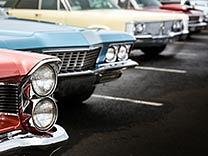Summer Start-up: Your car Storage Checklist
(NC) Warmth in the air has classic car lovers in looking forward to the pleasure of rolling down the windows and cruising through freshly cleaned roadways, enjoying the rumble of their car.
Get ready for another driving season with these tips from Hagerty and Aviva Insurance:
Fluids and filters:
• Change your fluids before each driving season, especially if your car has been stored for more than a year; this includes the engine oil, fuel tank and transmission. You don't want any water or accumulation getting in the way of a smooth ride. If fuel stabilizer has been used, you may be able to skip flushing the gas tank.
• While you are in there, change the oil filter. If you have an air compressor, take the air filter outside and blow dust and dirt off.
• You may also want to bleed the brakes to expel any water or impurities. At a minimum, make sure the brake and clutch master cylinders are full and leak-free.
Engine bay:
• Check for leaks around the engine bay and under the car. Temperature changes can damage seals and gaskets.
• Inspect belts and hoses. Replace any that show cracks, swelling, fraying or leaks — these could turn into major headaches in summer heat and humidity.
• Service your spark plugs so the engine fires strongly on all cylinders. Use a wire brush and spray-on plug cleaner. Before reinstalling, apply di-electric grease on the ends for the best connection. If your vehicle was stored more than 90 days, squirt some oil into each cylinder.
• Examine battery connections as winter weather may cause corrosion. Remove the negative side cable first, then clean both posts with a baking soda and water mix. Keep your charged battery somewhere warm until you are ready to fire it up.
Finishing touches:
• Check tire pressure and consider replacing tires with visible wear. Check for proper torque on lug nuts.
• Check all lights.
• Look for cracks, splits, wear or hardening in the rubber of suspension joints, bushing and pivot points. Hardening could lead to cracking, and you'll need to rebuild or replace shocks with any fluid leaks.
• While it may be tempting, don't rev the engine when you first start up or it could damage bearings and cylinders. Let it idle for a while, and take your vehicle for a 30 minute spin your first time out. When you get home, recheck for fluid leaks.
• Finally, make sure the insurance and registration are up to date before taking your car back on the road.
Find more information from your insurance broker or online at avivacanada.com/leisure-lifestyle.
www.newscanada.com
Comments
There are 0 comments on this post





